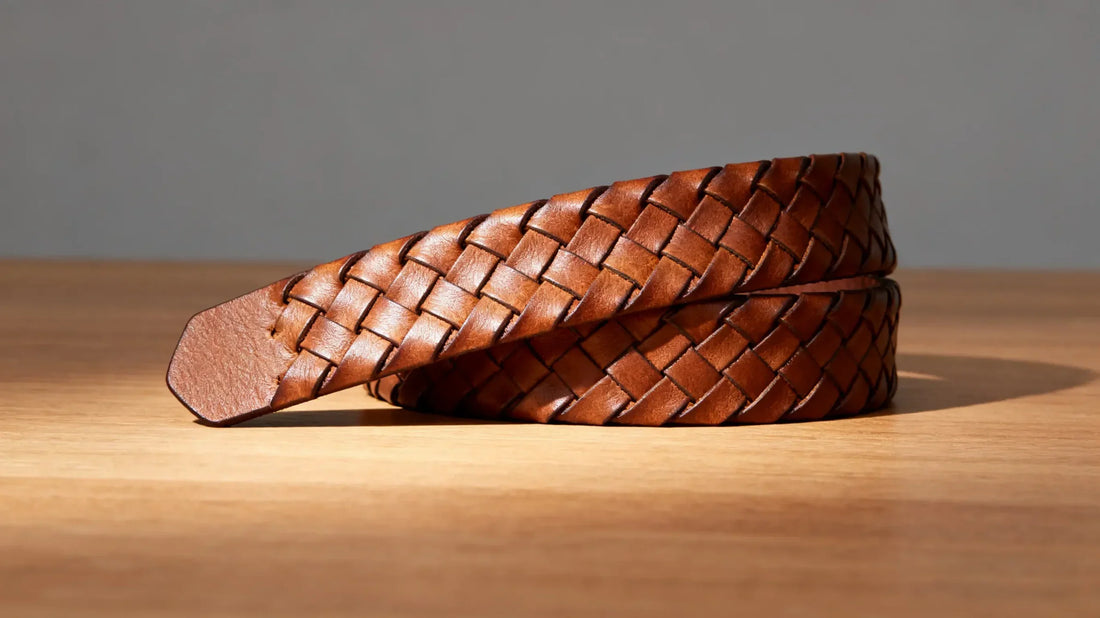
Basket Weave Pattern in Fashion and Design: Timeless Style
Share
Patterns carry meaning beyond their visual appeal. They tell stories of culture, craftsmanship, and identity. Among the many motifs in fashion and design, the basket weave pattern is one of the most enduring. Its crisscross structure is simple yet powerful, representing strength, balance, and artistry. From woven textiles in ancient civilizations to luxury leather belts on modern runways, the basket weave remains a timeless symbol of durability and style.
According to Architectural Digest, the basket weave has become a staple in contemporary interior design because of its ability to create rhythm and harmony in both small and large spaces. But its impact is not limited to architecture—it is equally beloved in fashion and personal accessories.
The Origins of the Basket Weave
The basket weave pattern is inspired by one of humanity’s oldest crafts: basketry. Early artisans interlaced reeds, grasses, and palm leaves to create containers that were both strong and functional. The beauty of the pattern lay in its simplicity: alternating over-and-under lines created a checkerboard effect that was visually pleasing and structurally sound.
Over centuries, this technique transcended basket-making. Communities worldwide—from Native American tribes to African weavers and Asian artisans—adapted the weave into mats, textiles, and decorative items. The design came to symbolize unity, resilience, and continuity, making it both functional and spiritual.
Basket Weave in Fashion
Textiles and Apparel
In fashion, the basket weave creates depth and texture. Lightweight cottons and linens woven in this style are breathable yet strong, ideal for summer dresses and jackets. The grid-like structure reflects light in a subtle way, giving garments sophistication without excessive embellishment.
Accessories: The Luxury of Texture
Where the basket weave truly shines is in accessories. Basket weave leather belts, for example, have long been associated with craftsmanship and heritage style. Unlike flat, plain belts, the woven surface adds dimension and richness. If you want to explore more refined options, check out our premium leather belts collection.
Similarly, handbags featuring basket weave embossing or woven construction have become icons of luxury fashion. Brands like Bottega Veneta have built entire identities around woven leather, proving the timeless appeal of this motif.
Jewelry and Footwear
The pattern also appears in jewelry—woven gold bangles or basket weave rings carry both elegance and durability. Woven sandals and loafers, especially in earthy tones, remain a summer favorite for their blend of comfort and style.
Basket Weave in Design and Interiors
Furniture
Furniture designers use basket weave cane, wicker, and rattan to create chairs, cabinets, and decorative panels. These pieces add warmth and texture to interiors, blending rustic charm with modern sophistication.
Flooring and Tiles
Basket weave layouts in hardwood flooring or marble tiles create striking visual effects. The alternating geometry draws the eye and brings timeless elegance to spaces.
Decorative Arts
From wallpapers to textiles, basket weave motifs are incorporated to create rhythm in design. They fit seamlessly into both modern minimalism and traditional décor, making them versatile and evergreen.
Symbolism of the Basket Weave
The interlaced structure of the basket weave is more than just visual—it represents interconnection. In many cultures, the pattern symbolizes how individual elements unite to create strength. In fashion, wearing a basket weave accessory can be seen as honoring tradition while embracing modernity.
This duality—heritage and innovation—is what makes the basket weave so beloved by designers and consumers alike.
Modern Trends and Revival
Fashion Revival
Social media platforms like Instagram and Pinterest are filled with DIY creators sharing basket weave projects. From woven belts to basket weave bracelets, the trend reflects a renewed appreciation for handmade artistry in an age of mass production.
Interior Renaissance
Interior designers also embrace the pattern, showcasing it in sustainable materials like bamboo and reclaimed wood. Its eco-friendly associations resonate with today’s design ethos, where natural aesthetics meet conscious living.
👉 If you’re interested in how belts reflect modern craftsmanship, you might also enjoy our feature on stretch belts vs. traditional belts.
How to Style Basket Weave in Fashion
- Handbags: A woven leather bag adds sophistication to casual jeans or evening dresses.
- Belts: A basket weave belt works with denim, chinos, or formal trousers, enhancing any outfit with subtle artistry. Explore our styling tips in men’s western belt fashion hacks.
- Shoes: Loafers or sandals with woven details are perfect for summer wardrobes.
- Jewelry: Basket weave-inspired bangles and cuffs create a geometric yet elegant statement.
Conclusion
The basket weave pattern is timeless because it balances practicality with artistry. From ancient crafts to today’s runways and interiors, its structure continues to inspire designers across industries. It symbolizes strength, heritage, and beauty—woven together in a way that never goes out of style.
Whether in fashion, furniture, or flooring, the basket weave remains proof that the simplest designs are often the most enduring.
✨ Ready to add timeless texture to your wardrobe? Start with a basket weave leather belt and experience how one accessory can elevate your entire look.
FAQ
Q1: What is the basket weave pattern used for in fashion?
It is commonly used in belts, handbags, shoes, and jewelry for added texture and craftsmanship.
Q2: Is the basket weave only for traditional design?
No, it blends well with both traditional and modern aesthetics.
Q3: How durable is a basket weave leather belt?
Very durable—the interlaced structure increases strength and longevity compared to flat leather.
Q4: Can I use basket weave in home design?
Yes, it’s popular in flooring, tiles, furniture, and wal
